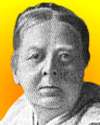 (source)
(source)
|
Mary Everest Boole
(1832 - 1916)
English mathematician and author who, lacking acceptance as a woman in the academic system, nevertheless learned the subject with a tutor and much of her own studying. Her books on education and mathematics include Philosophy and Fun of Algebra (1909). She was born Mary Everest, niece of Sir George Everest who gave the family name to Mount Everest. George Boole, the mathematician, married her in 1855. After he died young, age 32, just nine years later, she lived as a widow for fifty years.
|
Science Quotes by Mary Everest Boole (4 quotes)
All the modern higher mathematics is based on a calculus of operations, on laws of thought. All mathematics, from the first, was so in reality; but the evolvers of the modern higher calculus have known that it is so. Therefore elementary teachers who, at the present day, persist in thinking about algebra and arithmetic as dealing with laws of number, and about geometry as dealing with laws of surface and solid content, are doing the best that in them lies to put their pupils on the wrong track for reaching in the future any true understanding of the higher algebras. Algebras deal not with laws of number, but with such laws of the human thinking machinery as have been discovered in the course of investigations on numbers. Plane geometry deals with such laws of thought as were discovered by men intent on finding out how to measure surface; and solid geometry with such additional laws of thought as were discovered when men began to extend geometry into three dimensions.
— Mary Everest Boole
In Lectures on the Logic of Arithmetic (1903), Preface, 18-19.
Mathematics had never had more than a secondary interest for him [her husband, George Boole]; and even logic he cared for chiefly as a means of clearing the ground of doctrines imagined to be proved, by showing that the evidence on which they were supposed to give rest had no tendency to prove them. But he had been endeavoring to give a more active and positive help than this to the cause of what he deemed pure religion.
— Mary Everest Boole
In Eleanor Meredith Cobham, Mary Everest Boole: Collected Works (1931), 40.
Only dead mathematics can be taught where the attitude of competition prevails: living mathematics must always be a communal possession.
— Mary Everest Boole
In Mary Everest Boole: Collected Works (1931), Vol. 3, 1008.
The stimulus of competition, when applied at an early age to real thought processes, is injurious both to nerve-power and to scientific insight.
— Mary Everest Boole
In The Preparation of the Child for Science (1904), 44.
 In science it often happens that scientists say, 'You know that's a really good argument; my position is mistaken,' and then they would actually change their minds and you never hear that old view from them again. They really do it. It doesn't happen as often as it should, because scientists are human and change is sometimes painful. But it happens every day. I cannot recall the last time something like that happened in politics or religion.
(1987) --
In science it often happens that scientists say, 'You know that's a really good argument; my position is mistaken,' and then they would actually change their minds and you never hear that old view from them again. They really do it. It doesn't happen as often as it should, because scientists are human and change is sometimes painful. But it happens every day. I cannot recall the last time something like that happened in politics or religion.
(1987) -- 


